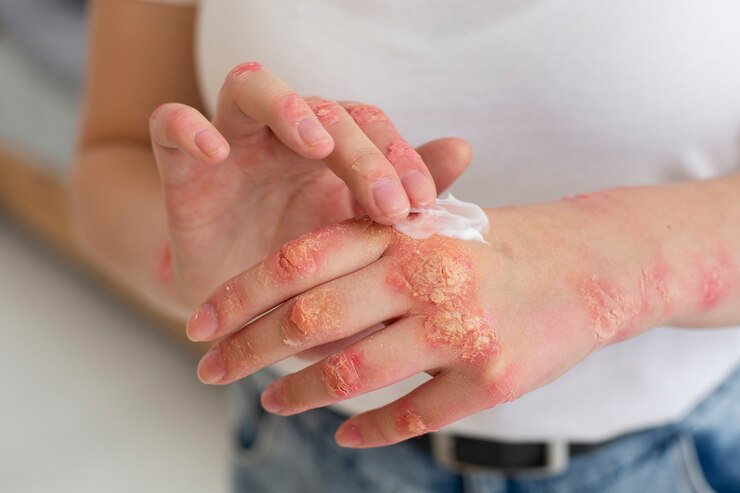Skin conditions like eczema have become increasingly common. While modern medicine offers effective treatments, many individuals seek alternative remedies with fewer side effects. Ayurveda, an ancient Indian system of medicine, offers holistic solutions for various ailments, including skin disorders like eczema. Let’s explore how Ayurveda approaches eczema treatment and its effectiveness in healing not only eczema but also other skin conditions. Ayurveda, an ancient Indian system of medicine, offers a treasure trove of natural remedies for various ailments, with its emphasis on balancing the body, mind, and spirit, Ayurveda provides personalized treatments that address the root cause of the problem rather than merely alleviating symptoms. In this blog, we’ll explore how Ayurveda can be harnessed to effectively treat eczema and other skin conditions.
Understanding Eczema in Ayurveda:
In Ayurveda, eczema is often classified as “Vicharchika,” a condition characterized by inflammation, itching, and the formation of dry, scaly patches on the skin. According to Ayurvedic principles, eczema is primarily caused by an imbalance in the body’s doshas, namely Vata, Pitta, and Kapha. This imbalance can be triggered by various factors such as improper diet, stress, environmental toxins, and genetic predisposition.
Ayurvedic Diagnosis and Treatment Approach:
Treating eczema in Ayurveda begins with a thorough assessment of an individual’s unique constitution (prakriti) and the imbalance of doshas (vikriti). This personalized approach allows Ayurvedic practitioners to tailor treatment plans that address the specific needs of each patient.
Ayurvedic Diagnosis:
Ayurveda views each individual as unique, with their own constitution (prakriti) and current state of imbalance (vikriti). Prakriti refers to a person’s inherent physical and mental characteristics, determined by the dominant doshas (Vata, Pitta, and Kapha) present at birth. Vikriti, on the other hand, refers to the current state of imbalance or disease. Ayurvedic practitioners assess these factors through detailed consultations, including pulse diagnosis (Nadi Pariksha), observation, and patient history. By understanding an individual’s prakriti and vikriti, practitioners can tailor treatment plans to address their specific needs and imbalances.
Dietary Modifications:
Diet plays a crucial role in Ayurvedic treatment eczema as it directly influences the balance of doshas in the body. For individuals with eczema, the focus is on pacifying the Pitta dosha, which is associated with heat, inflammation, and irritation. Pitta-aggravating foods such as spicy, fried, and acidic foods are to be avoided, as they can exacerbate symptoms. Instead, a cooling and hydrating diet is recommended, including fresh fruits (especially sweet fruits like melons and berries), vegetables (especially leafy greens and cucumbers), whole grains (like barley and quinoa), and herbal teas (such as chamomile and mint). Additionally, incorporating ghee (clarified butter) into the diet can help nourish and moisturize the skin from within.
Herbal Remedies:
Ayurvedic herbs are integral to treating eczema, as they possess properties that help balance the doshas and alleviate symptoms. Some commonly used herbs include:
- Neem: Known for its potent anti-inflammatory and antimicrobial properties, neem helps cleanse the blood and promote skin healing.
- Turmeric: A powerful anti-inflammatory and antioxidant herb, turmeric helps reduce inflammation and itching associated with eczema.
- Aloe Vera: With its soothing and moisturizing properties, aloe vera helps hydrate and heal irritated skin.
- Manjistha: This herb is renowned for its blood-purifying and detoxifying properties, making it beneficial for skin conditions like eczema.
These herbs can be consumed internally as capsules, powders, or teas, or applied topically as creams or ointments.
Detoxification Therapies:
Panchakarma, the Ayurvedic system of detoxification, is highly effective in eczema Ayurveda treatment by removing accumulated toxins and restoring balance to the doshas. Virechana (purgation) and Raktamokshana (bloodletting) are two specific therapies that may be recommended for individuals with eczema. Virechana helps cleanse the gastrointestinal tract and liver, while Raktamokshana purifies the blood, thereby reducing inflammation and skin irritation.
Lifestyle Modifications:
Lifestyle factors play a significant role in managing eczema and preventing flare-ups. Ayurveda recommends adopting stress management techniques such as yoga, meditation, and deep breathing exercises to reduce psychological stress, which can reduce eczema symptoms. Adequate sleep is essential for overall health and skin regeneration, while regular exercise helps improve circulation and reduce inflammation. Establishing a proper skincare routine using gentle, natural products is also important for maintaining skin health and preventing irritation.
By incorporating these Ayurvedic principles into their daily lives, individuals with eczema can experience significant relief from symptoms and achieve long-term healing and balance. However, it’s essential to consult with a qualified Ayurvedic practitioner for personalized guidance for Ayurvedic treatment for skin diseases and Ayurvedic treatment for eczema.
Eczema and other skin conditions can have a profound impact on one’s quality of life, but Ayurveda offers a holistic approach to healing that goes beyond surface-level symptom management. By addressing the underlying imbalances in the body through dietary modifications, herbal remedies, detoxification therapies, and lifestyle adjustments, Ayurveda empowers individuals to reclaim their skin health naturally.

